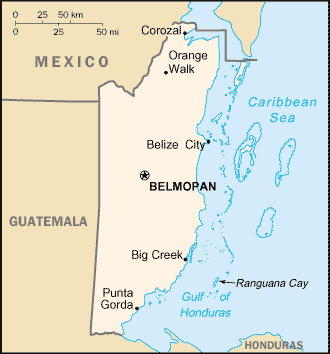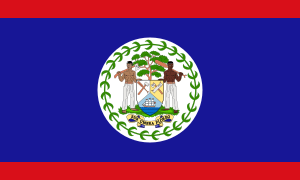Belize

For whatever reason, Belize is often overlooked and is widely regarded as an obscure Central American nation. But despite being in Central America, Belize is not Central American and is usually seen as being Caribbean, it's even in CARICOM
Modern-day Belize, and the north in particular, was once home to the oldest Mayan civilisations. Ancient architecture can still be seen throughout the country. During the 16th century the Spanish claimed all of Central America as a possession, but because the Mayans living in what is now Belize would not convert to Christianity, the Spanish did not settle in the area.
The hard, efficient wood that is mahogany grows in Central America. This is the reason that British sailors/pirates began settling around the Belize river. The 'Baymen' as they became known began setting up sawmills in the area using slavery in the 1630's. The logging trade in the area grew and earned money for the British despite it taking place on Spanish territory. By the 1750's fears grew among the Spanish that the British would claim the area for themselves, and the British became worried that the Spanish would try and remove the trade from the area.
In 1763, Spain agreed continue allowing the trade as long as it retained sovereignty over the region. But because they had not defined specific boundaries, the Baymen continued to expand their trade throughout the area and this agitated the Spanish, who felt that they were encroaching on their land. This increased tension between Britain and Spain and in the 1780's the Spanish began deporting Baymen to Cuba.
The Napoleonic wars in Europe, in which Spain sided with France, increased tension between Britain and Spain and in 1797, Spain declared war on Britain. The Baymen began worrying that the Spanish would attack them and so appealed to the governor of Jamaica, Alexander Lindsay, for help. Lindsay sent a colonel named Thomas Barrow to administrate the settlement. Barrow organized the lawless Baymen and introduced martial law in the settlement. In 1798 Spanish ships tried to force their way into the settlement through the sea but they were fought off by the Baymen on the island of St Georges Caye. The Baymen had given weapons to their slaves and this helped them win the battle (that and the fact that the Spanish sailors all had yellow fever)
The battle of St Georges Caye is remembered every 10th September in Belize and 'St Georges Caye Day' is a national holiday. Although the battle did not make the settlement independent, it did establish that the Baymen were not going to leave.
In 1823, Central America became independent from Spain and formed the 'United Provinces of Central America'. The territory that the Baymen settlement was on also seceded. In 1835 the British outlawed slavery and wanted to incorporate modern-day Belize into a British colony as to enforce this. In 1835, Guatemala became independent and the land was succeeded to them. The unrest throughout Central America caused an influx of Spanish-speaking refugees to move to what is now Belize and displace the Mayan population.
In 1859 the Guatemalan government was approached by the British who wanted them to cede the tracts of land that would become Belize. Guatemala agreed to do so, on the condition that the British build a railway from the Guatemalan capital of Guatemala City to Belmopan. The land was ceded to the British and became the colony of British Honduras, with Belize City as its capital. Despite the agreement, the British did not build a Railway from Guatemala City to Belmopan.
The colonial office began to crack down on British Honduras and took great steps to try and control the colony. They enforced the slavery ban but, although slavery was now illegal, there were still massive inequalities between the former slave-owning landowners and the former slaves. Many former slaves had no choice but to continue working in the logging industry. British Honduras attracted many British businesses, most notably the Belize Estate and Produce company, who bought almost half of the private land in the colony. British Honduras soon became entirely incorporated into the British Empire and was now reliant on the UK.
The great depression, which took place in the 1930's, crippled the British Honduran economy, which was dependent on selling timber to a British market. Demand for timber in the UK fell and unemployment became widespread. This caused a general sense of resent for the government amongst the unemployed, since the government had refused to introduce a minimum wage in the colony. In 1931, Belize was further damaged by a hurricane which destroyed parts of Belize City. The government reacted to this poorly and this caused riots throughout British Honduras during 1934, in response to this, the government legalised trade unions.
Many people from British Honduras went to fight in the second world war as part of the British forces but after the second world war, economic situations in the colony had not improved at all. After the second world war, many British colonies throughout the world were becoming independent and this led to an independence movement in British Honduras and the founding of the 'Peoples United Party (PUP)', who wanted constitutional change for the colony. In 1964 the British colonial office gave the colony some self-governance and the PUP was the first party in office, with George Price as the first prime minister. Price changed the capital from Belize City to Belmopan in 1970 and changed the name of the colony to 'Belize' in 1973.
The PUP ultimately wanted for Belize to become independent but they were hesitant to due to neighbouring Guatemala's claim to Belizean sovereignty. Because Belize had only been created because the British agreed to build a railway from Belmopan to Guatemala City, and they did not, the Guatemalan government believed that the land controlled by Belize was rightfully theirs. The only reason that Guatemala did not invade the colony was because that would lead to war with Britain. Belize did however manage to become entirely independent in 1981 but the British agreed to deploy troops in Belize to protect them.
Guatemala was the only nation not to recognise Belize and classed it as a breakaway territory. Negotiations between Guatemala, Belize, and the United Kingdom began. The three nations decided that the original decision was not worth fighting over and in 1991, Guatemala recognised Belize as a sovereign nation. In 1999 however, Guatemala changed its mind and renewed its claim over Belize. Guatemala deployed its army along the border with Belize who responded by placing its army on their side of the border. The British army also still remains in Belize. Why the British don't simply build the friggin' railroad so as to make amends is anyone's guess.
Belize is a very mixed nation, English is the official language although Spanish is also widely spoken. Most people in Belize are mixed race, descendant from English speaking settlers, African slaves and Spanish speaking refugees. Not only is Belize in the Commonwealth but it is also a commonwealth realm, meaning that Belize recognises the monarchy of the commonwealth as its own head of state.
The Belizean flag
